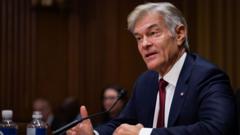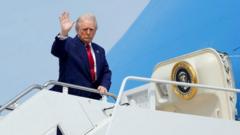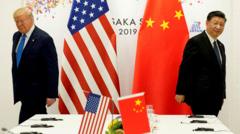As Denmark's prime minister and other officials navigate the potential ramifications of Donald Trump's territorial aspirations, the nation's leaders emphasize diplomacy while feeling the weight of global scrutiny.
**Denmark Faces Uncertainty Amid Trump's Greenland Aspirations**

**Denmark Faces Uncertainty Amid Trump's Greenland Aspirations**
Danish Leaders Grapple with Strategic Response to US President's Provocative Claims
In the heart of winter, Denmark's political scene is eerily tense as Prime Minister Mette Frederiksen oversees a nuanced response to Donald Trump's assertive claims over Greenland. Foreign Minister Lars Løkke Rasmussen has voiced deep concern regarding Trump's threats, including hefty tariffs aimed at Denmark if it obstructs the US bid for the Arctic territory. Despite expressing seriousness about the situation, Rasmussen highlighted the government’s intent to avoid inflammatory rhetoric.
In contrast to Trump’s sensational suggestion of possible military action, Frederiksen has dismissed such scenarios as unlikely and absurd. However, this incident has provoked swift response meetings among Denmark's leadership, reflecting unease in both political and business circles. Greenland's Prime Minister Mute Egede participated in high-stakes talks, underscoring the importance placed on Greenland’s fate, which is deeply interwoven with national identity.
Frederiksen's tone remains measured; she insists the future of Greenland should be determined solely by its inhabitants. This position echoes past confrontations with the US, including a previous diplomatic spat when Trump cancelled a planned visit to Denmark in response to her rejection of his purchase proposal. As political observers note, how Frederiksen balances reassurance to the US with a firm stance supporting Greenland is fraught with complexity.
Opposition voices in Denmark suggest that Frederiksen should assert a clearer denouncement of Trump's approach, with some arguing it undermines loyalty among allies and may unduly burden Greenlanders with decision-making pressure. Recent statements from Greenland's leadership align with calls for cultural and political autonomy, reflecting a movement away from historical ties that some view as remnants of colonialism.
As calls for independence gain traction among Greenland's youth, the questions of economic viability and sustainable governance surface. Dependence on Denmark for financial and structural support poses significant challenges—independence could spur a critical reassessment of those ties.
International reactions are shaping the discourse, with European leaders emphasizing borders’ sanctity, a sentiment underscoring the apprehension within the EU regarding US foreign policy shifts. Denmark is now braced for potential economic implications that may arise from potential trade wars, particularly concerning possible tariffs Trump may impose on Danish exports.
As Denmark's leadership prepares for these changing tides, hope persists that a focus on broader contentious issues by the incoming administration may defer immediate confrontations over Greenland. However, uncertainty looms large as projections of a future shaped by Trump's new presidency signal escalating complexities in transatlantic relations.
In contrast to Trump’s sensational suggestion of possible military action, Frederiksen has dismissed such scenarios as unlikely and absurd. However, this incident has provoked swift response meetings among Denmark's leadership, reflecting unease in both political and business circles. Greenland's Prime Minister Mute Egede participated in high-stakes talks, underscoring the importance placed on Greenland’s fate, which is deeply interwoven with national identity.
Frederiksen's tone remains measured; she insists the future of Greenland should be determined solely by its inhabitants. This position echoes past confrontations with the US, including a previous diplomatic spat when Trump cancelled a planned visit to Denmark in response to her rejection of his purchase proposal. As political observers note, how Frederiksen balances reassurance to the US with a firm stance supporting Greenland is fraught with complexity.
Opposition voices in Denmark suggest that Frederiksen should assert a clearer denouncement of Trump's approach, with some arguing it undermines loyalty among allies and may unduly burden Greenlanders with decision-making pressure. Recent statements from Greenland's leadership align with calls for cultural and political autonomy, reflecting a movement away from historical ties that some view as remnants of colonialism.
As calls for independence gain traction among Greenland's youth, the questions of economic viability and sustainable governance surface. Dependence on Denmark for financial and structural support poses significant challenges—independence could spur a critical reassessment of those ties.
International reactions are shaping the discourse, with European leaders emphasizing borders’ sanctity, a sentiment underscoring the apprehension within the EU regarding US foreign policy shifts. Denmark is now braced for potential economic implications that may arise from potential trade wars, particularly concerning possible tariffs Trump may impose on Danish exports.
As Denmark's leadership prepares for these changing tides, hope persists that a focus on broader contentious issues by the incoming administration may defer immediate confrontations over Greenland. However, uncertainty looms large as projections of a future shaped by Trump's new presidency signal escalating complexities in transatlantic relations.






















